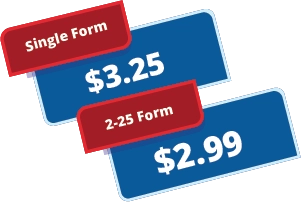E-file Form 1099-B Online with Tax2efile
Effortlessly e-file your Form 1099-B with Tax2efile. Our intuitive platform ensures secure and accurate tax reporting to the IRS for brokerage transactions. Simplify the process with our streamlined interface, guiding you through each step for a hassle-free experience. Register today and initiate your seamless 1099-B filing.

What is Form 1099-B? (Proceeds From Broker and Barter Exchange Transactions)
Form 1099-B, as per the official description, is called Proceeds from Broker and Barter Exchange Transactions. It is an informational return that is utilized to report the sales of securities, commodities, and forward contracts, as well as some transactions of barter exchanges to the IRS.
Form 1099-B is Issued By
- Brokers: To report any sale, exchange, or redemption of stocks, bonds, mutual funds, and other financial products in a non-retirement account.
- Barter Exchanges: To report on the transfer of property or services between members of a network where no money is exchanged.
Who Receives It
If you have sold a capital asset (such as stocks or cryptocurrency) through a brokerage, or if you have been part of a bartering network, you will be issued a 1099-B.
The Key Link 1099-B Data Flow (Schedule D and Form 8949)
The amounts on Form 1099-B are not directly reported to the IRS with your main return. Rather, the information from your 1099-B is leveraged to fill out two other very important forms: Form 8949 and Schedule D.
- Form 8949 (Sales and Other Dispositions of Capital Assets): This form serves as a detailed listing of every transaction reported on your 1099-B. Each sale of an asset is further clarified with categories (covered vs. non-covered, short-term vs. long-term)
- Schedule D (Capital Gains and Losses): The aggregated sums from Form 8949 (total short-term gains/losses and total long-term gains/losses) are transferred to Schedule D, which calculates your net capital gain or loss for the year. This is the amount that ultimately affects your income tax.
Understanding and E-Filing Your Form 1099-B
Key Information on Your 1099-B: A Box-by-Box Guide
Understanding the most important boxes ensures accurate tax reporting
- Box 1a Description of Property: Provides a brief description of the asset sold
- Box 1b Date Acquired: Mention the date that originally purchased or acquired the asset.
- Box 1c Date Sold or Disposed: The date the asset was sold, exchanged, or disposed of.
- Box 1d Proceeds: The gross proceeds from the sale, usually reduced by any commissions or transaction fees.
- Box 1e Cost or Other Basis: What you paid for the asset, plus any adjustments (like commissions or other expenses)
- Box 1f Accrued Market discount: The amount of market discount that accrued while you held a debt instrument

- Box 1g Wash Sale loss disallowed: The amount of any loss that was disallowed due to the wash sale rule.
- Box 2 Check Boxes: There are three check boxes required to mention short term gain or loss or long-term gain or loss or ordinary
- Box 3 Check Boxes: There are two check boxes to report if the property sold was a collectible (e.g. art, coins, mentals) and another check box used to report Qualified Opportunity Fund (QOF) investment
- Box 4 Federal income tax withheld: Any amount of federal income tax withheld from the sale proceeds (usually due to backup withholding).
- Box 5 Check box: This check box indicates if the securities sold were noncovered securities.
- Box 6 Reported to IRS: There are two check boxes used to whether the broker reported sale as Gross proceeds or Net proceeds
- Box 7 Check Box: Check this box if the loss is not allowed based on amount in Box 1d
- Box 8 Profit or (loss) realized in tax year on closed contracts: Used to report the Regulated Futures Contracts, Foreign Currency Contracts, and Section 1256 Option Contracts
- Box 9 Unrealized profit or loss on open contracts (prior year): Report the market-to-market value of contracts that were open at the end of the previous tax year
- Box 10 Unrealized profit or loss on open contracts (Current Tax Year): The market-to-market value of contracts that are open at the end of the current tax year.
- Box 11 Aggregate Profit or (Loss) on Contracts: The total net profit or loss for the year from these contracts.
- Box 12 Check Box: Check this box if basis reported to IRS
- Box 13 Bartering: Used to reports the fair market value (FMV) of goods, services, or property exchanged through a barter transaction.
- Boxes 14, 15, & 16: Used to mention state tax information including state name, Identification number, state income tax withheld.
How to E-File Form 1099-B Online with Tax2efile
- Register securely with Tax2efile and select Form 1099-B
- Input you payer and recipient details
- For multiple recipients, use our Bulk Upload Feature by simply uploading an Excel sheet.
- Review and submit to IRS

Watch our step-by-step video on How to E-File IRS Form 1099-B with Tax2efile
Who Must File IRS Form 1099-B Form?
Form 1099-B must be filed for every single transaction involving the sale of all stocks, mutual funds, bonds, commodities, regulated contracts, debt instruments, and forward contracts. Other information includes any federal tax withheld, gains or losses incurred, and state tax withholdings. This form can also be filed by companies that participate in certain bartering activities with others. This form is used to report changes in capital structure or control of a corporation in which they hold stocks.
When is the Form 1099-B Deadline?
| Filing Type | Deadline |
|---|---|
| Recipient copy | January 31st |
| IRS Paper Filing | February 28th |
| IRS Electronic Filing | March 31st |
Note: If the due date/deadline falls on a Saturday, Sunday, or federal holiday, the filer will need to E-file on the next business day.
Get Started by Registering with Tax2efile Today!
Our IRS-approved e-fling services make tax season stress-free. Sign up Today!

Frequently Ask Questions
Find answers to commonly asked questions about our products and services.
Form 1099-B is used to report broker and barter exchange and transactions This may required to recognize gain from the receipt of the cash, stock(s), or other property that was exchanged for the corporation’s stock.
Form 1099-B will be received If you have sold a stock(s), bonds or other securities through a broker or had a barter exchange transaction and exchanged Property or services rather than paying cash you will likely receive a Form 1099-B.
In order to file a Form 1099-B the following is required: payers and recipients Name, Address, TINs, CUSIP Number, State Identification number, State tax withheld amount, Dates of acquired & sold or disposed, amounts of: proceeds, costs, accrued market discount, wash sale loss disallowed, federal income tax withheld, profit or loss realized in the year on closed contract, Unrealized profit or (loss) on open contracts, Aggregate profit or (loss) on contracts and Bartering
Yes, Tax2efile offers a bulk upload feature that allows the user to upload all of the borrowers to an excel sheet for a faster process.
Yes, Tax2efile offers printing and mailing service! Our dedicated team will print and mail out each form you filed.
Yes, Form 1099-B is applicable to cryptocurrency transactions. If you sold or exchanged cryptocurrencies during the tax year, you may receive a Form 1099-B from your broker. Ensure accurate reporting of crypto transactions to comply with IRS regulations.
If you engaged in broker or barter transactions but did not receive a Form 1099-B, you are still responsible for reporting these transactions. Contact your broker to obtain the necessary information for accurate tax filing.
Yes, foreign investments are reportable on Form 1099-B. Ensure you provide accurate information on the sale or exchange of foreign securities to comply with IRS regulations.
Using our fast electronic service, you can complete your filing within 5 minutes.
Tax2efile allows you to correct a mistake to the recipient’s information for TINs, Names & amounts.
To file Form 1099-B for a single return the filing fee is $3.25.
The IRS requires Form 1099-B to be submitted by February 28 through the mail and by March 31 if you file the form electronically however, recipients’ copy should be mailed by January 31.
Failure to file the 1099 form by the deadline may result in IRS penalties. The penalty can be from $60 per 1099 Form, the maximum penalty can be up to $630,500. If you submit Form more than 31 days to before August 1, the penalty increases to $120 per 1099 Form and maximum penalty up to $1,891,500. If you file after August 1, the penalty can be from $310 per 1099 Form and maximum penalty up to $3,783,000. Additionally, there are penalties for failure to furnish the payee statement.
Covered securities are subject to cost basis reporting by brokers, while non-covered securities are not. The type of securities may affect how gains and losses are reported on your tax return. Consult IRS guidelines or Tax2efile support for clarification.
Yes, transactions involving the sale or exchange of mutual funds are reportable on Form 1099-B. Provide accurate details, including purchase and sale information, for each mutual fund transaction.
Still have questions?
If you have more questions, please refer to our FAQ page. Contact our customer support team for assistance.





